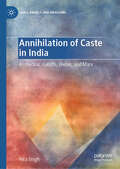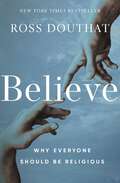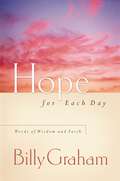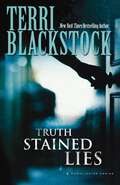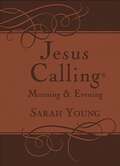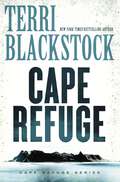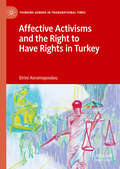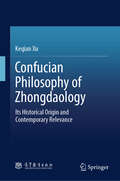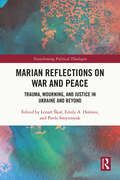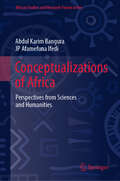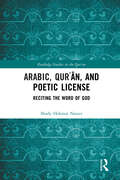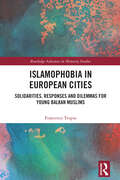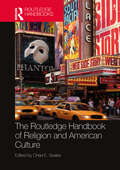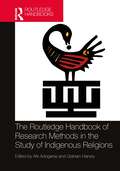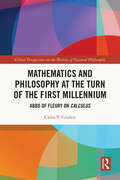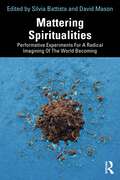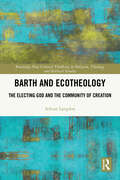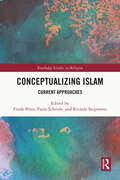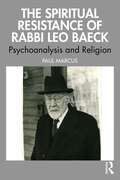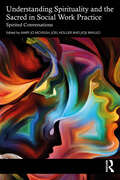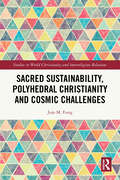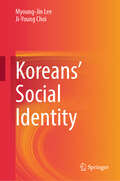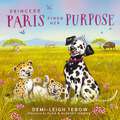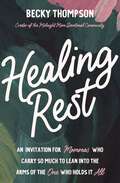- Table View
- List View
Annihilation of Caste in India: Ambedkar, Gandhi, Weber, and Marx (Marx, Engels, and Marxisms)
by Hira SinghThis book offers a critical re-examination of the relationship between caste and class. Singh demystifies caste based on a comparative analysis between a Weberian and Marxian understanding of power. He rejects Max Weber’s account of caste as rooted in culture which Weber saw as analytically distinct from the economic and political power. In contrast, Singh offers a Marxist analysis of caste as a matter of land (means of production) and labor (social relations of production). Extending his critique of the cultural understanding of caste, Singh examines one of the most prominent accounts of caste as a religious phenomenon specific to Hinduism. The book aims to show the intrinsic interconnectedness of class and caste.
Believe: Why Everyone Should Be Religious
by Ross DouthatAn Instant <b>New York Times Bestseller</b> "Truly a Mere Christianity for the 21st century"--World magazine <p> Do you ever wish you had more faith? Here is a blueprint for thinking your way from doubt to belief. As a columnist for the New York Times who writes often about spiritual topics for a skeptical audience, Ross Douthat understands that many of us want to have more faith than we do. Douthat argues that in light of what we know today it should be harder to not have faith than to have it. With empathy, clarity, and rigor, Douthat explores: Why nonbelief requires ignoring what our reasoning faculties tell us about the world. How modern scientific developments make a religious worldview more credible, not less. Why it's entirely reasonable to believe in mystical and supernatural realities. How an open-minded religious quest should proceed amid the diversity of religious faiths. How Douthat's own Christianity is informed by his blueprint for belief. <p> With clear and straightforward arguments, Believe shows how religious belief makes sense of the order of the cosmos and our place within it, illuminates the mystery of consciousness, and explains the persistent reality of encounters with the supernatural. Highly relevant for our current moment, Believe offers a pathway for thinking your way from doubt into belief, from uncertainty about our place in the universe into a confidence that we are here for a reason.
Hope for Each Day: Words of Wisdom and Faith (A 365-Day Devotional)
by Billy GrahamBeloved inspirational author and pastor Billy Graham understood the importance of hope. Having hope translates to living a life full of peace, joy, and love. God's Word overflows with hope throughout its pages--all the way from Genesis to Revelation. With Billy Graham's Hope for Each Day, that biblical hope can be yours every day.This 365-day devotional is great for fans of the original Hope for Each Day, followers of Billy Graham, or as a gift for men and women needing a renewed sense of hope. After you read Hope for Each Day, your soul will be blessed as God's everlasting hope remains at the center of all that you do.Look for additional 365-day devotionals from Billy Graham:Truth for Each DayPeace for Each DayWisdom for Each Day
Truth Stained Lies (Moonlighters Series)
by Terri BlackstockNew York Times and USA TODAY bestselling suspense author Blackstock asks, When truth doesn&’t make sense, will lies prevail?&“Crisp prose, an engaging story, and brisk pacing make this thriller another home run for Blackstock.&” —Library Journal, starred reviewCathy Cramer is a former lawyer and investigative blogger who writes commentary on high-profile homicides. When she finds a threatening note warning her that she&’s about to experience the same kind of judgment and speculation that she dishes out in her blog, Cathy writes it off as mischief . . . until her brother&’s wife is murdered and all the &“facts&” point to him. The killer has staged the crime to make the truth too far-fetched to believe. Working to solve the murder and clear her brother&’s name, Cathy and her two sisters, Holly and Juliet, moonlight as part-time private investigators. Juliet, a stay-at-home mom of two boys, and Holly, a scattered ne&’er-do-well who drives a taxi, put aside their fear to hunt down the real killer.Stakes rise when their brother&’s grieving five-year-old son is kidnapped. As police focus on the wrong set of clues, the three sisters and their battered detective friend are the only hope for solving this bizarre crime, saving the child, and freeing their brother.Full-length Suspense NovelIncludes Discussion Questions for Book ClubsPart of the Moonlighters seriesBook One: Truth Stained LiesBook Two: DistortionBook Three: Twisted Innocence
Jesus Calling Morning and Evening, with Scripture References: Yearlong Guide to Inner Peace and Spiritual Growth (A 365-Day Devotional) (Jesus Calling®)
by Sarah YoungMeditate on the hope and peace of Jesus all throughout the day as you begin and end each day in the presence of the Savior who is always with you and loves you forever. Each morning entry is from Jesus Calling®, and each evening includes powerful and poignant excerpts from Sarah&’s other bestselling books.By spending time in the presence of the Savior all day in Jesus Calling Morning and Evening Devotional, you&’ll find a yearlong guide with:Comforting words of hope and encouragementReassurance of Jesus' unending love for youGentle direction based on ScriptureGuided thought for you to focus on just before you turn out the lightWritten-out Scripture verses to connect deeper with JesusReflection and meditation based on God&’s WordEncouragement from the One who understands you perfectly and loves you forever With 365 days of morning and evening devotions, this edition is sure to be a favorite in the popular Jesus Calling® line. This format offers men and women more opportunities to be aware of Jesus&’ presence throughout the day. This edition is perfect for any stage of life and makes a wonderful gift for special occasions, birthdays, or for self-purchase.
the Cape Refuge (Cape Refuge Series)
by Terri BlackstockA gripping tale from New York Times bestselling suspense author Terri Blackstock. When the kindest couple in Cape Refuge is found murdered at their church, their daughter will have to find the killer . . . before her own husband is convicted.Wade and Thelma Owens run a halfway house on the small island of Cape Refuge that caters to wayward souls just out of prison. So when Wade and Thelma turn up brutally murdered, the town goes into shock, concerned that one of the Hanover House residents is a murderer who could strike again.Shattered by her parents&’ deaths, Morgan Cleary struggles to keep Hanover House running while her husband, Jonathan, has been arrested for the murder.As the killer runs free, a lethal race against time ensues, with far more than the halfway house at stake.Full-length suspense novel with a thread of romancePart of the Cape Refuge seriesBook One: Cape RefugeBook Two: Southern StormBook Three: River&’s EdgeBook Four: Breaker&’s Reef
Affective Activisms and the Right to Have Rights in Turkey (Thinking Gender in Transnational Times)
by Eirini AvramopoulouThis book presents a novel approach to the study of contemporary social movements and activism. Based on extensive ethnographic research of the life and politics of feminist, LGBTQI+, and women’s religious groups in Istanbul from 2007 to 2015, it explores the affects, meanings, and interpretations these groups express in their activism—in particular, their strategic use of human rights’ language to claim institutional and social legitimacy and their reinterpretation of gender/queer theory across politics of difference to make sense of global dynamics that affect their everyday lives. Chapters interweave personal accounts and life histories of individual activists with specific historical events to demonstrate the activists’ dissidence regarding the conditions that have defined their differently marginalised positions in Turkey and the significance of the formation of unexpected alliances. The ambivalent, yet inescapable, bargaining tool of rights is analysed as a demand over affective democratic visions, citizenship and a life worth living, and thus the right to have rights, as it is argued, pushes us to reflect on how power works when the political and affective surplus value invested in the need to rethink of rights (even beyond human rights themselves) lies both in the search for ways of institutionalising and implementing rightful demands, as well as in outlining more affective visions of political resistance. By arguing that activism is a performative and affective language that is defined by intersectional hopes, desires and dreams, as much as it engages with legal battles that define who or what might appear as being broken under specific historical and social settings, Affective Activisms employs gender and sexuality as analytical tools to make sense of local and transnational politics of resistance in the face of the re-emergence of authoritarian regimes, sexual harassment, gender violence, homo/trans phobia, and Islamophobia in Turkey and worldwide. It will be of interest to students and scholars across the fields of women's, gender and sexuality studies, queer theory, critical human rights and political theory, sociology, and social anthropology.
Confucian Philosophy of Zhongdaology: Its Historical Origin and Contemporary Relevance
by Keqian XuThis book aims to give an account of the origin and the historical evolution of the philosophical tradition of the “Way of Zhong,” or “zhongdaology,” which represents not only the basic characteristic of Confucian philosophical thinking but also the core spirit of Chinese culture in general. It addresses the following questions: · Is Confucianism philosophy or not? · In the rich ethics, sociology, political science and other theories of Confucianism is there a consistent philosophical metaphysics and philosophical methodology? · What is the difference between the Confucian or the traditional Chinese philosophical way of thinking and that in the Western tradition? · What influence and significance do the basic principles of Confucian philosophy have on contemporary China and even the world? The book traces back to the original sources in ancient Confucian classics, conducts systematic and comprehensive research on the core philosophical concept of Confucianism, namely the philosophy of the zhong dao (the Middle Way), and analyzes the multiple meanings and philosophical connotations clustered in the word "zhong" and embodied in the idea of “zhong dao.” It points out the consistent philosophical view held by Confucianism in a series of philosophical issues, such as heaven and human, mind and material, internal desire and external conditions, subjective will and objective feasibility, ideal and reality, constancy and flexibility, means and purpose, motivation and effect, diversity and harmony, centrality and inclusiveness, etc., and termed it as "zhongdaology." It further discusses the presentation of “zhongdaological thinking” in the Confucian ethics and moral theory, social and political theory, historical view and even aesthetic view. It also provides comprehension of contemporary Chinese social and political cultural phenomena from the perspective of “zhongdaology.” This book is a rare introduction for students who want to understand Confucian cultural traditions from a philosophical perspective. It is also an illuminating read for general readers who want to understand the philosophical logic behind complex social and cultural phenomena in traditional and contemporary China.
Marian Reflections on War and Peace: Trauma, Mourning, and Justice in Ukraine and Beyond (Transforming Political Theologies)
by Lenart Škof Emily A. Holmes Pavlo SmytsnyukThis book presents an original Marian approach towards war and peace, dedicated to the suffering of children, women, and men in Mariupol and elsewhere in Ukraine and in the world. Offering new theological perspectives on the contemporary impact of war, the contributions take inspiration from the figure and symbol of Mary – as protector of children and guardian of peace, intermediary of the incarnation, as well as model for ecumenical, interreligious, and intercultural engagements. The chapters explore the role of Mary as a symbol for feminist and activist reflections, for the communication of suffering as the mater dolorosa, for power when appropriated for political ends, and for healing and reconciliation in peace-building efforts. The book provides readers with valuable theological reflections on conflict, global theological ethics, ecofeminist and peace-building thinking in theology, and contemporary political theology.
Conceptualizations of Africa: Perspectives from Sciences and Humanities (African Studies and Research Forum Series)
by Abdul Karim Bangura Jp Afamefuna IfediThis book discusses how Africa has been understood and defined across various academic fields. Building on the influential works of Valentin-Yves Mudimbe and more recent studies by Axel Fleisch and Rhiannon Stephens, this book bridges previous limitations by offering a comprehensive, interdisciplinary analysis. Each chapter examines the conceptualization of Africa within a specific discipline, balancing local and global perspectives, blending competing viewpoints, and providing suggestions for future research. The book will be essential for students, scholars, and researchers interested in a better understanding of the diverse and complex narratives that shape our knowledge of Africa and its intellectual heritage.
Arabic, Qurʾān, and Poetic License: Reciting the Word of God (Routledge Studies in the Qur'an)
by Shady Hekmat NasserThis book examines the similarities between the Qurʾān and ancient Arabic poetry, analyzed through the framework of Arabic grammar prior to their standardization and subsequent development into distinct genres.Of central relevance is the relationship between the Qurʾān and Arabic poetry, and how Muslim scholars defined this relationship based on a formulaic structural approach rather than a thematic and motif-oriented one. The book aims to reposition the so-called non-standard usages of Arabic vernaculars, non-canonical readings of the Qurʾān, and unusual grammatical structures in ancient poetry at the heart of the Arabic-Islamic tradition. The book deals with different theological, legal, and social controversies regarding the proper recitation of the Qurʾān and its individuation from poetry and other verbal arts. For the first time, this study offers a comprehensive categorization of unusual grammatical structures in both the Qurʾān and ancient Arabic poetry, which Arab grammarians classified as poetic license. The close affinity between the linguistic styles of the Qurʾān and ancient Arabic poetry suggests that the Qurʾān was a form of ancient Arabic poetry. To individuate the Qurʾān, Muslim scholars put in place various theological and legal restrictions for its proper recitation, the most important of which was tajwīd (Qurʾānic recitation).The book will interest students and scholars of Qurʾānic and Islamic studies, as well as those researching Arabic poetry and grammar.
Islamophobia in European Cities: Solidarities, Responses and Dilemmas for Young Balkan Muslims (Routledge Advances in Minority Studies)
by Francesco TrupiaThe demise of socialism in Southeast Europe coincided with the breakout of wars and genocidal violence against local Muslim populations. After being displaced and forced to migrate to different European countries, those former socialist citizens quickly developed institutions of sociability and unobtrusively enacted postulates of solidarity. This book brings a spotlight on the “generations after” born to Balkan Muslim families whose repatriation could not take place due to the continuous political instability and insecurity in their homelands. It investigates the new modes of these “second generations” to respond to the current crisis of liberal democracy and rampant Islamophobia in their places of residence. By relating spatial issues to broader religious and political questions, this study shines a light on the civic engagement, religious practices and political sensitivities of young Muslims with Balkan roots in Belgium, Germany, Italy and Poland. The book will be of interest to academics, researchers and policy-makers working in the areas of Islamic Studies, Migration Studies, Anthropology of Religion and Memory Studies.
The Routledge Handbook of Religion and American Culture (Routledge Handbooks in Religion)
by Chad E. SealesThe Routledge Handbook of Religion and American Culture explains where religion is made in the United States. It offers essays profiling cultural sites, including energy, industry, public life, music, arts and entertainment, and life and death. These sites organize the volume’s 31 chapters, demonstrating how cultural religion has been constructed and performed in specific historical and ethnographic case studies. This volume offers a much-needed resource for Religious Studies scholars and students interested in the study of religion and culture in the United States, as well as those in American Studies, Anthropology of Religion, Sociology of Religion, Material Culture Studies, Environmental Studies, and History.
The Routledge Handbook of Research Methods in the Study of Indigenous Religions (Routledge Handbooks in Religion)
by Graham Harvey Afe AdogameExciting developments in research among, with and by Indigenous scholars and communities are enriching a wide range of disciplines, methodologies and trans-disciplinary conversations. This growing field offers important insights and provocations about methods and approaches. Key issues such as relationality, decolonisation, research ethics, pedagogy and collaboration necessarily require improvements both in scholarly description and in scholarly practice. Similarly, critical themes for Indigenous people intersect strongly both with recent scholarly “turns”, such as embodiment, gender, performance, place, ontology, and materiality. The Routledge Handbook of Research Methods in the Study of Indigenous Religions reflects on appropriate approaches and methods with over 28 chapters by a team of international contributors. The Handbook is divided into three parts: Core themes and critical issues in research and debate about Indigenous Religions Disciplines and methods, focusing on ways in which researchers gain and share understanding about Indigenous religions Recent scholarship about broad regions of the world Within these sections, central issues, debates and problems are examined, including cosmology, diaspora, bodies and materiality, witchcraft and divination, ritual studies, ethnography and fieldwork, heritage studies, ecology, feminist methodologies, decolonial methods and Indigenist methods, research ethics, activism, health, and peoplehood, kinship and relations. The Routledge Handbook of Research Methods in the Study of Indigenous Religions is essential reading for students and researchers in religious studies and Indigenous studies, and the handbook will also be very useful for those in related fields such as sociology, anthropology, history and politics.
Mathematics and Philosophy at the Turn of the First Millennium: Abbo of Fleury on Calculus (Global Perspectives on the History of Natural Philosophy)
by Clelia V. CrialesiAt the turn of the first millennium, scientific and philosophical knowledge was far from dormant. Arithmetic, with its diverse calculation techniques and number theory, served as a bridge to philosophy, theology, and the study of the physical world. Even something as simple as a series of multiplication tables could unlock a profound knowledge of both the divine realm and natural phenomena. Such is the case with Abbo of Fleury’s Commentary on the Calculus.Mathematics and Philosophy at the Turn of the First Millennium sheds light on Abbo’s original philosophical system anchored in two central doctrines, which serve as a compass to navigate it: the theory of unity (henology) and the theory of composition. Yet, the Commentary on the Calculus covers much more. The present study, thus, explores an eclectic range of topics – from water clocks to barleycorns, constellations to human voice, synodic month to the human lifespan, and numbers to God. Abbo’s work is an ambitious attempt to tie together the study of both the visible and invisible realms, what can be measured and what cannot, what can be quantified and what exceeds quantification.Scholars and students of the history of philosophy and mathematics will be introduced to a pivotal figure from an often overlooked era. They will be provided with fresh insights into the spread of Neopythagorean doctrines in the early Middle Ages, as they learn how these ideas were transmitted through arithmetic texts and harmonised with theology and natural philosophy. They will also get to know the medieval fraction system and calculus practices.
Mattering Spiritualities: Performative Experiments for a Radical Imagining of the World Becoming (Routledge Advances in Theatre & Performance Studies)
by David Mason Silvia BattistaMattering Spiritualities brings together an array of international scholars and practitioners to explore spirituality in embodiment through the lens of performance, performative writing, and performance studies.The book concerns spirituality and takes the body as the site of whatever it is we call spirituality. The methodological assumption is that the opposition of body and spirit is a false binary that calls for re-examination and revision. It stems from the argument that people can deliberately shift their boundaries of perception and knowing through practice, technologies and performative techniques that can alter the way in which they perceive the ecologies in which they are embedded. This approach understands that careful attention to which bodies are performing in any given scenario is crucial, as is a sensitivity to the ramifications of any body’s race, gender, class, and biological ability. Performance can therefore be regarded as anything through which individuals and collectives experiment with bodies as technologies. Each chapter engages with such experiments to explore how bodies experience and relate to other bodies, human and other-than-human, but also how, by mobilizing bodies and changing relationships between them, practitioners can transform people, spaces and places, objects, ecologies large and small, and shift the borders-of-the-known. Such experiments can also reveal intersectional dynamics within given social, political, and biological borders offering new perspectives and angles of analysis.This collection intends to serve transdisciplinary studies and to support varied learning and teaching environments for undergraduate, postgraduate, and PhD students.
Barth and Ecotheology: The Electing God and the Community of Creation (Routledge New Critical Thinking in Religion, Theology and Biblical Studies)
by Adrian LangdonBarth and Ecotheology offers a critical and constructive reading of Karl Barth’s theology in the context of the Anthropocene. It reflects on how a contemporary doctrine of creation must be broad enough to address issues such as climate change, colonialism and racism, sexism, as well as integrating modern science. Such a theology would resist the human domination of nature and the various forms of displacement occurring in modernity. With Barth, the author contends that a theology of creation grounded in the self-revelation of God in Jesus Christ is the best place to rethink what it means to be human and to exist within the community of creation. Nevertheless, if we are to affirm the livingness of the world, creaturely differences, and a central place for land and place, then critical additions to Barth are needed. To accomplish this, the book provides constructive reinterpretations of Barth’s theological method, doctrine of God, creation by the Word and Spirit, anthropology, and reconciliation. What emerges is a vision of the triune God of love as the source and ground of all that is. Along the way, Barth is brought into dialogue with ecotheology as well as theologians such as Wolfhart Pannenberg, Dietrich Bonhoeffer, and Bruce McCormack. The volume will be of particular interest to theologians focused on the doctrine of creation, ecotheology, and Barth studies.
Conceptualizing Islam: Current Approaches (Routledge Studies in Religion)
by Frank Peter Paula Schrode Ricarda StegmannIn recent decades, academic debates on how to conceptualize ‘Islam’ as an object of study and how to approach it theoretically have been revitalized. Not only has research on Islam grown enormously and become much more differentiated, but Islam is also being discussed more intensively in society and politics than ever before.This reader, which brings together the perspectives of various disciplines, provides an overview of academic approaches to Islam against the backdrop of these, in some cases tense, entanglements. Through two contributions from scholars working on Buddhism and Hinduism, these debates are situated in the context of broader trajectories of research history. In sum, this book does not only offer its readers entry points to a more complex and refined understanding of Islam, but also to research processes within the study of Islam as well as religion in general.
The Spiritual Resistance of Rabbi Leo Baeck: Psychoanalysis and Religion
by Paul MarcusThe Spiritual Resistance of Rabbi Leo Baeck provides an overview of the life of Dr. Leo Baeck (1873–1956), a German-Jewish rabbi, theologian, historian and Holocaust survivor, from a psychoanalytic perspective.Paul Marcus approaches Baeck’s life and intellectual/theological contribution as it interfaces with a broadly defined psychoanalysis. This book describes and explains how Baeck maintained the rudiments of his autonomy, integration and humanity while remaining in Nazi Germany and while in the ghetto Theresienstadt, displaying astonishing courage, character, and goodness—a triumph of a civilized person amidst Nazi brutality. Marcus also considers psychic resilience and moral psychology and assesses contemporary criticisms of Baeck.The Spiritual Resistance of Rabbi Leo Baeck will be of interest to academics and scholars of psychoanalytic studies, spirituality, Jewish studies and resistance. It will also appeal to psychoanalysts in training and in practice.
Understanding Spirituality and the Sacred in Social Work Practice: Spirited Conversations
by Jioji Ravulo Joel Hollier Mary Jo McVeighSocial work is constantly epistemically evolving and embracing diverse bodies of knowledge to inform its ontology and practice frameworks.Over the years, the impact of feminist, post-colonial, and queer theory, for example, has broadened the social work lens and invited a welcome departure from dominant Westernised, patriarchal, and positivist paradigms. However, the separation of the spiritual realm from casework, clinical, community, and group work traditions of social work remained steadfast. The last decade or so has seen forages into the issues of social work and spirituality. This examination into spirituality and social work has shown that for many service users, spiritual practices (be they religious or non-religious) are important in their lives and their way out of difficulties. Concurrently, relationships between socio-political movements and global religions have grown increasingly complex. To create a truly holistic approach to the needs of service users it is important that social work policy and practice give voice to these complexities and understand the place of spirituality within service delivery. This book critically reflects upon and discusses the intersecting role of spirituality in the lives of people who access social work services.By gathering contributions from people with lived experience, practitioners, and academics, this book will explore a comprehensive range of issues, opening the area of spirituality to current critical, socio-political, and cultural thought. It will be of interest to all social work scholars, students, and practitioners.
Sacred Sustainability, Polyhedral Christianity and Cosmic Challenges (Studies in World Christianity and Interreligious Relations)
by Jojo M. FungThis book explores the concept of Polyhedral Christianity that has the capacity to embrace the inter/multicultural-religious complexities of our contemporary world, taking inspiration from Pope Francis’ use of the image of a polyhedron. The author suggests that Polyhedral Christianity calls for an Enspirited Leadership. This spirit-driven leadership is grounded in creational pneumatology and cosmicism to promote resilient religiocultural communities that enjoy a more relational harmony of all life-forms on Earth, conscious of an interdependent interconnected oneness in the sacred web of life in the cosmos/creation. The chapters engage with indigenous notions of sacred sustainability from the primal as well as the Buddhist, Hindu, and Islamic religious traditions. This innovative corpus will be of particular interest to the scholars of theology, teología del pueblo, World Christianity, and interreligious relations.
Bhartiya Dnyan Pranali First Semester FYBA New NEP Syllabus - RTMNU: भारतीय ज्ञान प्रणाली पहिले सत्र एफ.वाय.बी.ए. नवीन एन.इ.पी. अभ्यासक्रम - राष्ट्रसंत तुकडोजी महाराज नागपूर विद्यापीठ
by Dr Nalini Ishwardas Borkarभारतीय ज्ञान प्रणाली हे पुस्तक भारतीय ज्ञान प्रणालीच्या विविध पैलूंवर प्रकाश टाकते. यात प्राचीन भारतीय तत्त्वज्ञान, विज्ञान, गणित, योग, आयुर्वेद, कला आणि संस्कृती यांचा सखोल अभ्यास केला आहे. भारतीय शिक्षण परंपरा आणि तत्त्वज्ञानाचे स्वरूप, तसेच वेद, उपनिषदे, आणि अन्य ग्रंथांमधील तत्त्वज्ञानाचा आधुनिक जगाशी असलेला संबंध यात स्पष्ट करण्यात आला आहे. ग्रामीण आणि शहरी भागातील शिक्षण पद्धती, गुरुकुल आणि आधुनिक शिक्षण प्रणाली यांचा तुलनात्मक अभ्यास देखील पुस्तकात समाविष्ट आहे. विद्यार्थी-अनुकूल भाषाशैली आणि सुसंगत उदाहरणांच्या मदतीने संकल्पना स्पष्ट करण्यात आल्या आहेत, त्यामुळे अभ्यासक आणि संशोधकांसाठी हे पुस्तक उपयुक्त ठरते.
Koreans' Social Identity
by Myoung-Jin Lee Ji-Young ChoiThis book examines the changing characteristics of Korean society and Koreans in various areas, including politics, economics, and society, providing rich analyses on social identity. Factoring in the trajectory of Korean history, the authors chart the rapid economic growth of Korea and the ways in which this has significantly improved Koreans' material living standards. The book shows that despite the Cold War and inter-Korean confrontation, active citizen participation has institutionalized democracy in Korea. A society once characterized by strong familial ties and patriarchal verticality has shifted to a more horizontal structure with diverse values. Transitions from agricultural to industrial and information societies have occurred within one or two generations. Rapid aging is another critical issue, with Korea experiencing one of the fastest aging trends globally. The shift toward a multicultural society challenges the traditional identity of Koreans based on a single ethnicity. Against this backdrop, this book seeks to capture the characteristics of changing Korean society and the people living in it, based on the concept of social identity that an individual's evaluation is not just a temporary personal feeling or prejudice but a cultural product. It allows for an objective analysis of a society or its cultural characteristics by measuring social identity. The first part of the book introduces the concept of social identity and presents analysis results in several fields. The second examines changes in the values and attitudes of representative Koreans. The third part discusses the social problems and tasks created by the changes in various values and attitudes. Finally, the last section explores concrete measures to overcome these problems and aim for social integration in future and emphasizes elements that enhance social trust and integration. It is relevant to sociologists and scholars working across various social science dimensions focused on Korea.
Princess Paris Finds Her Purpose
by Demi-Leigh TebowAnti-trafficking advocate and former Miss Universe and Miss South Africa Demi-Leigh Tebow encourages young readers to find their purpose and help others in need in her first children&’s book about a princess who loses her crown, starring Demi&’s real-life dog Paris the dalmatian.When her crown is stolen, Princess Paris fears she&’ll never get it back. How can she represent her king without her crown? She doesn&’t feel much like a princess and worries all the animals on the Royal Savanna won&’t take her seriously without it. But as each animal Paris meets faces a unique problem, she discovers that being a princess requires more than wearing a shiny crown.This adventurous storyis paw-fect for ages 4 to 8,focuses on finding your purpose and being kind,is a creative conversation starter between parents and children about helping others, andis a perfect choice for a nursery display or a baby shower or birthday gift.Take your children on this adventurous African safari with Paris, Kobe, and Chunk (the whole Tebow Pack!) and show them that helping others is the greatest purpose of all.
Healing Rest: An Invitation for Mommas Who Carry So Much to Lean into the Arms of the One Who Holds It All
by Thomas NelsonThe last few years have been a lot, haven't they? In your home, in your community, in the world. There's no reason to wonder why you need rest. Of course you need peace. No matter the stage of your motherhood, even when your children have children of their own, a momma's heart carries so much in every season.Join Becky Thompson, USA Today bestselling author and founder of the Midnight Mom Devotional community, as she guides you into Healing Rest.Readers willlearn how to lean into the promised presence of Jesus and find soul-deep peace;experience the heart-healing truth of what it means to be safely held in a world that feels far from secure;discover how connecting to the heart of the Father resets and regulates your body's nervous system;find Scripture based and science backed truth to still your racing thoughts; andencounter the calming comfort of God's Spirit in the midst of every hard and hidden place of your heart. Healing Rest shares stories from the Bible, scientific insights, and practical ways to confront overthinking with God's Word. This book dives deep into the promise of peace, not just for those facing anxiety, but for every momma who needs it. Thompson reminds readers that they do not have to carry the weight of their burdens alone, and that God is always with them. Momma, you deserve peace. Come experience rest in the arms of the only One who can hold it all.
